A variety of hormones have a significant impact on the complicated process of hair growth under the microscope. These chemical messengers are important in regulating the growth cycle of hair follicles, as well as defining hair thickness, color, and even patterns of hair distribution across the body. Let's look at how androgens (testosterone and dihydrotestosterone - dht), estrogens, thyroid hormones, cortisol, insulin, insulin-like growth factor-1 (IGF-1), prolactin, and progesterone affect hair development. It's crucial to note that genetics, lifestyle circumstances, and overall health all play a role in determining hair quality. If you are concerned about the health of your hair, speaking with a medical practitioner or a dermatologist can provide personalised advice and treatment choices.
Unraveling the Connection Between Hormones and Hair Growth
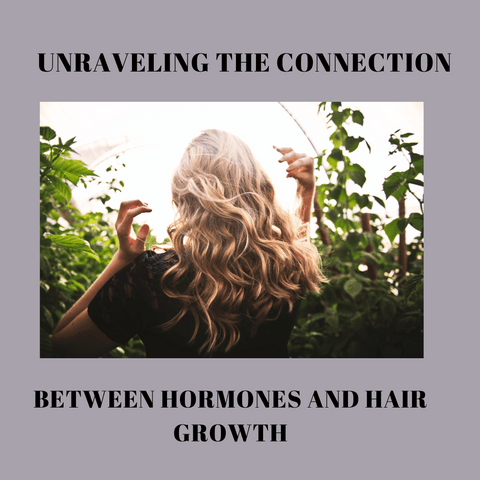
Unravelling the delicate relationship between hormones and hair growth reveals a complex interaction that controls the entire lifecycle of hair follicles. Understanding this link sheds light on the mechanics driving hair growth and loss, as well as the numerous elements that contribute to these processes. Let's delve deeper into this relationship, including the hair growth cycle, androgens and hair loss, estrogens and hair health, thyroid hormones and hair, cortisol and stress, insulin and hair health, prolactin and hair loss, progesterone and hair, genetics and hormones, hormonal treatments, and hormonal changes over a lifetime. Their complex interactions influence the fate of hair follicles as well as the quality of hair strands. Genetics, overall health, and lifestyle choices all play a role in the balance of these hormones. Consultation with a online dermatologist or medical practitioner is recommended for personalised advice on hair health and any concerns.
Understanding Hair Follicles and Their Growth Cycle
Understanding hair follicles and their growth cycle can help you better understand the dynamic process of hair growth and the elements that influence it. Hair follicles are microscopic, complex structures implanted in the skin that are responsible for hair production. Hair grows in three stages: anagen (growth phase), catagen (transitional phase), and telogen (resting phase). Genetics, hormones, age, health and nutrition, medical conditions, medications, and stress all influence the hair growth cycle. If you're worried about your hair growth or suffering from major hair loss, a medical practitioner or dermatologist can offer personalised advice and appropriate treatment choices.
Role of Hormones in Hair Growth and Loss
Hormones play an important role in the complex process of hair growth and loss. The balance of hormones regulates the duration of various phases of the hair development cycle and so defines the general health and appearance of hair. Here's an in-depth look at how hormones influence hair growth and loss:
-
Androgens (Testosterone and Dihydrotestosterone - DHT): Androgens are male sex hormones that are found in modest concentrations in females. DHT is a powerful testosterone derivative that has been linked to hair loss. DHT binds to androgen receptors in hair follicles, causing them to shrink, resulting in shorter growth cycles and finer hair strands in people who are genetically predisposed to androgenetic alopecia (male/female pattern baldness). This causes hair thinning and loss in the long run.
-
Estrogens: Estrogens are largely female sex hormones, but they are also present in males, albeit in lesser concentrations. Estrogens stimulate hair development by extending the anagen (growth) phase of hair follicles, increasing the number of active hair follicles, and keeping hair growing. This is why, during periods of greater estrogen levels, such as pregnancy, women frequently have thicker and healthier hair. However, changes in estrogen levels, such as those experienced during menopause, might result in hair thinning.
-
Thyroid Hormones (T3 and T4): Thyroid hormones are essential for controlling the body's metabolism, including hair follicle growth. Thyroid hormone imbalances can cause alterations in the hair growth cycle. Hypothyroidism (low thyroid hormone levels) may result in brittle, dry hair and hair loss, whereas hyperthyroidism (high thyroid hormone levels) may result in hair thinning.
-
Cortisol (Stress Hormone): Chronic stress can cause cortisol levels to rise, disrupting the hair growth cycle. Increased cortisol levels can cause hair follicles to enter the telogen (resting) phase too soon, resulting in telogen effluvium. This causes more hair to fall out than usual.
-
Insulin and Insulin-Like Growth Factor-1 (IGF-1): Insulin is a hormone that controls blood sugar levels, but it also influences hair growth. Insulin resistance, a disease linked to type 2 diabetes and metabolic syndrome, can raise testosterone levels in the body, contributing to hair thinning and loss.
-
Prolactin: Prolactin is a pituitary gland hormone that is predominantly involved with milk production in breastfeeding women. In some circumstances, high prolactin levels can cause hair thinning and loss.
-
Progesterone: While the effects of progesterone on hair growth are not as well characterised as those of other hormones, it can alter hair texture and volume. Variations in progesterone levels during the menstrual cycle may have an effect on hair quality.
-
Aging and Hormones: Hormonal changes can alter the hair growth cycle as people age. Hair thinning and texture changes might occur as a result of a steady decrease in certain hormones.
-
Medications and Hormones: Some medications, such as hormonal contraceptives and hormone replacement therapy, can affect the balance of hormones in the body and subsequently impact hair growth.
Specific Hormones and Their Impact on Hair
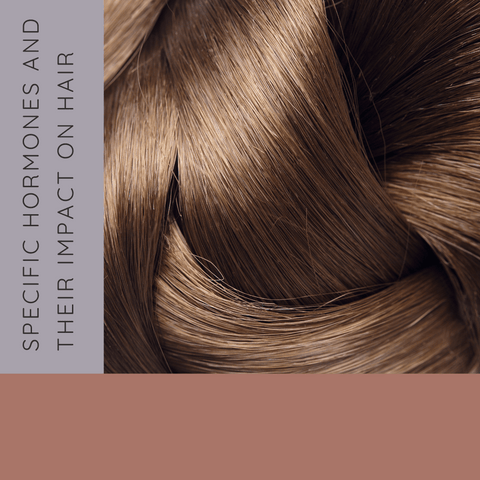
Dihydrotestosterone (DHT), Oestrogens, Thyroid Hormones (T3 and T4), Cortisol (Stress Hormone), Insulin and Insulin-Like Growth Factor-1 (IGF-1), Prolactin, Progesterone, Follicle-Stimulating Hormone (FSH) and Luteinizing Hormone (LH), Growth Hormone, Melatonin, and Cytokines are all listed. Understanding that the complex interactions of various hormones, genetics, lifestyle factors, and general health determine hair health is crucial. If you have considerable hair loss or changes in hair quality, a medical practitioner or dermatologist can provide specialised advice and appropriate treatment choices.
Estrogen: The Growth Promoter
Estrogen, also known as the "female hormone," does play an important function as a growth promoter in many elements of a woman's physiology, including hair development. It has a favorable effect on hair health and helps to maintain strong, healthy hair. Here's how estrogen works as a hair growth promoter:
-
Prolonged Anagen Phase: One important method estrogen increases hair development is by prolonging the anagen (growth) phase of hair follicles. Active cell division and hair elongation characterise this phase. Oestrogen prolongs the anagen phase of hair follicles, resulting in longer and thicker hair strands.
-
Increased Follicle Count: Estrogen stimulates hair follicle proliferation, increasing the number of active follicles on the scalp. This results in denser hair coverage and gives the appearance of more volume.
-
Improved Hair Texture: Estrogen improves hair texture by making it smoother and shinier. It helps maintain the health of the hair shaft, reducing brittleness and breakage.
-
Reduced Hair Shedding: Estrogen can help reduce the rate of hair shedding by maintaining the follicles in the anagen phase. This means fewer hair strands enter the telogen (resting) phase, leading to less overall hair loss.
-
Pregnancy and Hair: Due to increased estrogen levels, pregnant women frequently have thicker, more luscious hair. High amounts of estrogen during pregnancy extend the anagen period, resulting in less hair shedding. This is why many pregnant women feel an improvement in their hair health during this period.
-
Postpartum Effects: Following childbirth, estrogen levels fall dramatically, leading a greater number of hair follicles to enter the telogen phase at the same time. This can result in telogen effluvium, a disorder in which excessive hair shedding happens a few months after giving birth. This shedding, however, is just temporary, and hair growth normally returns to normal within a year.
-
Menopause and Hair: Estrogen levels drop during menopause, which can cause hair thinning and texture changes in some women.
It's vital to note that, while estrogen promotes hair growth and quality, hormonal balance is essential. Too much or too little estrogen might cause hormonal abnormalities that can harm hair health. Individual responses to hormonal variations can also differ depending on genetics and other variables. If you are concerned about your hair's health or are experiencing substantial hair loss, speaking with a medical practitioner or dermatologist can provide insight into the underlying causes as well as appropriate treatment choices customised to your specific needs.
Testosterone and Dihydrotestosterone (DHT): The Double-edged Swords
Testosterone and its derivative, dihydrotestosterone (DHT) are indeed double-edged swords when it comes to their effects on the body, particularly on hair growth and various physiological processes. Let's explore how testosterone and DHT can have both positive and negative impacts:
Testosterone:
Positive Effects:
-
Sexual Development: Testosterone is a key hormone responsible for the development of male sexual characteristics during puberty, such as the growth of facial and body hair, the deepening of the voice, and the development of the Adam's apple.
-
Muscle Development: Testosterone is essential for muscle development and maintenance. It promotes protein synthesis and aids in the growth of lean muscle mass.
-
Bone Health: Testosterone promotes bone density and strength by increasing bone mineralization and lowering the risk of osteoporosis.
Negative Effects:
-
Hair Loss: While testosterone promotes the growth of face and body hair, in people with a genetic predisposition, it can also be transformed into DHT by the enzyme 5-alpha reductase. DHT attaches to hair follicles, resulting in miniaturisation, reduced hair growth cycles, and, eventually, hair loss.
-
Acne: Increased testosterone levels can cause an increase in sebum production, which can contribute to acne and other skin problems.
-
Aggression and Mood Swings: High testosterone levels have been linked to increased aggression, irritability, and mood swings.
Dihydrotestosterone (DHT):
Positive Effects:
- Sexual Differentiation: DHT is a more potent form of testosterone that plays an important role in the development of male external genitalia during fetal development.
Negative Effects:
-
Hair Loss: DHT is a major cause of androgenetic alopecia, often known as male/female pattern baldness. DHT attaches to hair follicles in the scalp, causing miniaturisation, thinner hair strands, and eventual hair loss in people who have a hereditary susceptibility.
-
Prostate Growth: DHT also aids in the development of the prostate gland. In men, an enlarged prostate, also known as benign prostatic hyperplasia (BPH), can cause urinary problems.
-
Acne: Increased DHT levels, like testosterone, can contribute to excessive sebum production and the development of acne.
Hormone-Related Hair Loss Conditions
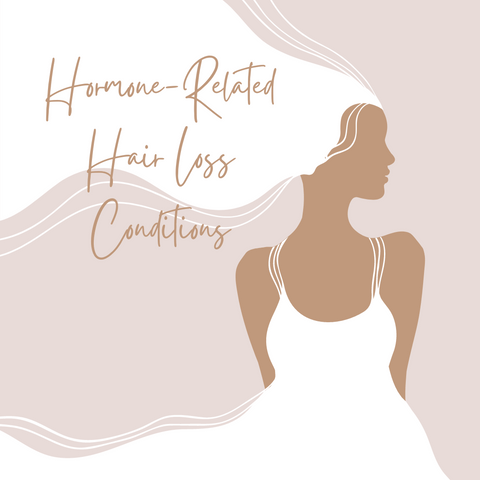
Hormonal imbalances or sensitivities can cause a variety of hormone-related hair loss problems. These disorders, which cause varying degrees of hair thinning and loss in both men and women, can affect both men and women. Here are a few examples of hormone-related hair loss conditions:
-
Androgenetic Alopecia (Male/Female or female pattern baldness): This is the most common kind of hair loss, and it is influenced by both genetic and hormonal factors.The gradual thinning of hair on the scalp caused by the actions of dihydrotestosterone (DHT) on genetically susceptible hair follicles is known as androgenetic alopecia. DHT binds to follicles and causes them to shrink over time, resulting in shorter growth cycles and finer hair strands.
-
Alopecia Areata: Hormonal fluctuations can set off an autoimmune illness. When the immune system targets hair follicles, it causes sudden hair loss in circular, coin-sized patches on the scalp or other parts of the body.
-
Telogen Effluvium: Hormonal changes can cause this disorder, in which a greater number of hair follicles than usual enter the telogen (resting) phase at the same time. This causes significant shedding and hair thinning. Childbirth, hormonal contraceptive modifications, and stress can all be hormonal triggers.
-
Postpartum Hair Loss: Hormone levels drop considerably after childbirth, leading many hair follicles to enter the telogen phase at the same time. This might cause severe hair loss a few months after giving birth. Hair growth usually returns to normal within a year if the problem is transient.
-
Polycystic Ovary Syndrome (PCOS): PCOS is a hormonal condition that causes women to produce too much androgen. Increased androgen levels, such as testosterone, can cause scalp hair thinning, hirsutism (excessive body and facial hair), and acne.
-
Hypothyroidism and Hyperthyroidism: Imbalances in thyroid hormones may affect the cycles of hair growth. Hypothyroidism (low thyroid hormone levels) can cause hair thinning, whereas hyperthyroidism (high thyroid hormone levels) can cause brittleness and breaking.
-
Hyperprolactinemia: High levels of prolactin, a hormone that stimulates milk production, can cause hair loss and thinning.
-
Cushing's Syndrome: This uncommon disorder is caused by long-term exposure to high levels of the hormone cortisol. It can cause scalp hair thinning, facial hair development in women, and other health problems.
-
Hypopituitarism: When the pituitary gland does not produce enough hormones, particularly those that regulate thyroid and sex hormones, it can cause a variety of hormonal abnormalities that affect hair development.
-
Menopause: Menopause-related hormonal changes, such as decreasing estrogen levels, can cause hair loss and texture changes in certain women.
These diseases illustrate the complex link that exists between hormones and hair health. If you feel you are having hormone-related hair loss, consult with a medical expert or dermatologist. They can assist in determining the underlying reason and recommending appropriate therapy solutions to address the problem.
Androgenetic Alopecia: The Genetic Influence
Androgenetic alopecia, also known as male or female pattern baldness, is a hereditary condition that causes hair loss. It is the most prevalent cause of hair loss in men and women alike. The word "androgenetic" refers to the fact that both genetic factors and androgen hormones, specifically dihydrotestosterone (DHT), play a role in its development. Here's how genetics play a role in androgenetic alopecia:
-
Genetic Predisposition: The primary predictor of whether a person will develop androgenetic alopecia is their family history. You may be genetically predisposed to hair loss if your parents, grandparents, or close relatives on either side of your family have experienced it.
- Inheritance Pattern: Multiple genes are involved in the hereditary vulnerability to androgenetic alopecia. While there is no single "baldness gene," changes in numerous genes increase the likelihood of acquiring the disorder.
- Role of Androgens: DHT, a testosterone derivative, is a significant cause of androgenetic alopecia. Hair follicles in specific areas of the scalp (such as the frontal and crown portions of the head) are more vulnerable to the effects of DHT in those who are genetically prone to the condition.
- Hair Follicle Miniaturization: The interplay of hereditary factors and DHT results in hair follicle miniaturisation. During each hair development cycle, damaged hair follicles get progressively smaller and produce finer hair strands.
- Shortened Anagen Phase: Genetics and hormones influence hair growth cycles. Individuals with androgenetic alopecia have a shortened anagen (growth) phase, which results in shorter hair strands that do not achieve their full potential length.
-
Progressive Thinning: Hair thinning is caused by a combination of shortened anagen phases and hair follicle miniaturisation. The damaged follicles eventually generate either fine, hardly noticeable hair or stop generating hair entirely.
PCOS, Menopause, and Thyroid Imbalances: When Hormones Go Awry"
Hormonal imbalances can have serious consequences for many aspects of health, including hair growth. Polycystic ovarian syndrome (PCOS), menopause, and thyroid abnormalities can all upset the delicate hormonal balance and cause hair problems. Let's take a look at how each of these disorders can affect hair health:
-
Hormonal Disruption: PCOS is a hormonal condition in which women have increased amounts of androgens (male hormones). These elevated testosterone levels might interrupt the normal hair development cycle, resulting in severe scalp hair thinning.
-
Hirsutism: Elevated androgen levels can also promote hirsutism, or excessive hair growth on parts of the body where males traditionally grow hair, such as the face, chest, and back.
-
Hair Thinning: In addition to hirsutism, women with PCOS may experience hair thinning on the scalp as a result of the hair growth cycle being disrupted.
-
Estrogen Decline: Oestrogen levels drop dramatically during menopause. Estrogen is a hormone that encourages the development and thickness of hair. The loss of estrogen can cause hair thinning, brittleness, and changes in texture.
-
Telogen Effluvium: Telogen effluvium is a condition in which a high number of hair follicles enter the telogen (resting) phase at the same time as a result of menopause-related hormonal changes. This might cause excessive hair shedding and thinning.
-
Hypothyroidism (Low Thyroid Hormones): Thyroid hormones control metabolism, which includes hair growth. Hair growth might slow down with hypothyroidism, resulting in hair thinning, dryness, and brittleness.
-
Hyperthyroidism (Excessive Thyroid Hormones): Hair health can also be affected by hyperthyroidism. Because of the faster growth cycles, hair may become fine and prone to breaking.
It's crucial to note that, while certain illnesses might cause hair problems, they also frequently cause other symptoms. If you feel that a hormone imbalance is hurting your hair's health, get medical advice immediately:
-
Consult a Healthcare Professional: Consult a healthcare expert or dermatologist if you have PCOS, menopausal symptoms, or thyroid abnormalities and are suffering from hair-related issues. They are capable of determining the underlying illness and recommending relevant remedies.
-
Treatment Options: The treatment for various disorders differs. Managing insulin resistance, using androgen-control medicines, and making lifestyle changes can all help with PCOS. Hormone replacement therapy and other therapies can help with menopausal symptoms. Thyroid disorders are addressed with drugs and lifestyle changes.
-
Hair Treatments: To enhance hair health, your healthcare professional may recommend hair treatments such as minoxidil, finasteride, and specialised hair care products in addition to addressing the underlying hormonal problem.
Remember that correcting the hormonal imbalance is frequently the first step towards better hair health. A customised approach to your unique condition can yield the best results for controlling hair-related issues caused by hormonal imbalances.
Coping with Hormonal Hair Loss: What Can Be Done?
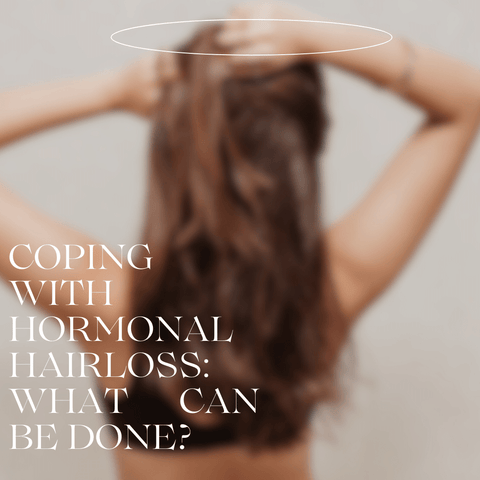
Managing and improving hormonal hair loss can be difficult, but there are various tactics and therapies available to help. Here are some strategies for dealing with hormonal hair loss:
-
Consult a Healthcare Professional: If you feel that hormone imbalances are affecting your hair loss, the first step is to see a doctor or a dermatologist. They can diagnose the underlying illness and make therapy recommendations.
-
Addressing Underlying Health Conditions:
-
For PCOS: Managing insulin resistance through diet, exercise, and medication can assist in balancing hormone levels and enhancing the health of your hair if you have PCOS.
-
For Thyroid Imbalances: Medication and lifestyle modifications are used to control thyroid hormone levels in the treatment of hypothyroidism or hyperthyroidism.
Hormone Replacement Therapy (HRT):
-
During Menopause: By supplementing estrogen levels, hormone replacement therapy (HRT) can help alleviate menopause-related hair loss. However, the decision to use HRT should be made in consultation with a healthcare provider, taking into account individual health factors and risks.
- Medications:
-
Minoxidil: This over-the-counter topical medication is approved for the treatment of both male and female androgenetic alopecia. It can stimulate hair growth and reduce hair loss.
-
Finasteride: This prescription medication is primarily used to treat male pattern baldness. It works by preventing testosterone conversion to DHT, which can help prevent further hair loss.
- Lifestyle Changes:
-
Healthy Eating: Nutrient-rich foods can help with hair health. Focus on a diet rich in vitamins (especially B vitamins), minerals (such as zinc and iron), and protein.
-
Stress Management: Use stress-reduction techniques such as meditation, yoga, and deep breathing. Chronic stress can exacerbate hormonal imbalances and lead to hair loss.
-
Exercise: Regular physical activity can help improve overall hormonal balance and promote better circulation, both of which can benefit hair health.
- Specialised Hair Care:
-
Use gentle shampoos and conditioners on your scalp and hair.
-
Excessive heat styling, tight hairstyles, and harsh treatments that can damage hair follicles should be avoided.
- Hair Extensions and Wigs:
-
Hair extensions and wigs can provide a temporary solution to thinning hair and boost self-confidence while undergoing treatment.
- Support Groups and Counseling:
-
Joining support groups or seeking counseling can help you cope with the emotional aspects of hair loss.
Remember that treatment outcomes will vary depending on the underlying cause of hair loss, genetics, and individual reactions. It is critical to have reasonable expectations and to be patient, as progress may take time. Consult a healthcare expert about your concerns and treatment choices to determine the best approach for controlling hormonal hair loss depending on your specific case.
Medical Treatments for Hormone-Related Hair Loss
Medical treatments for hormone-related hair loss seek to correct underlying hormonal imbalances while also encouraging hair growth. Various techniques and drugs might be employed depending on the individual problem causing the hair loss. Here are several medical therapies for hormone-related hair loss that are routinely used:
-
Minoxidil is an FDA-approved over-the-counter topical drug for the treatment of androgenetic alopecia (male/female pattern baldness).
-
It stimulates hair growth by increasing blood flow to hair follicles and lengthening the anagen (growth) phase of the hair cycle.
-
Minoxidil is available in several concentrations, including 2% and 5% solutions, and is typically applied to the scalp.
-
Finasteride is a prescription medication that is primarily used in men to treat male pattern baldness (androgenetic alopecia).
-
It works by inhibiting the enzyme 5-alpha reductase, which converts testosterone to dihydrotestosterone (DHT), the hormone responsible for hair follicle miniaturisation.
-
Finasteride can slow hair loss and promote hair regrowth, but it may not be appropriate for women of childbearing age due to pregnancy risks.
-
Spironolactone is a prescription medication that is occasionally used off-label to treat hair loss in women suffering from androgenetic alopecia, also known as PCOS.
-
It is an anti-androgen that works by reducing the effects of androgens on hair follicles such as DHT. It is especially useful when androgen levels are high and contributing to hair loss.
-
Hormone replacement therapy (HRT) can be considered for menopausal women experiencing hair loss due to declining estrogen levels.
-
Supplementing with estrogen can help improve hair thickness and reduce hair loss associated with menopause. However, the decision to use HRT should be made after consulting with a healthcare provider about the potential risks and benefits.
- Oral Contraceptives:
-
Certain oral contraceptives (birth control pills) with anti-androgenic properties may be prescribed to women with androgenetic alopecia or PCOS-related hair loss.
-
These pills can aid in the regulation of androgen levels as well as the reduction of androgen's impact on hair follicles.
- Thyroid Medications:
-
Medication to regulate thyroid hormone levels is prescribed for hair loss caused by thyroid imbalances such as hypothyroidism or hyperthyroidism.
-
Thyroid hormone replacement therapy, which addresses the underlying hormonal imbalance, can help restore hair growth.
- Anti-Inflammatory Medications:
-
In some situations of autoimmune-related hair loss, such as alopecia areata, corticosteroids or other anti-inflammatory drugs may be used to reduce the immune response and stimulate hair regeneration.
It's vital to remember that the treatment option you choose is determined by the underlying reason for the hormone imbalance and hair loss, as well as your personal health. A trained healthcare physician or dermatologist should prescribe and oversee medical therapy. They will evaluate your individual illness, medical history, and potential dangers to decide the best treatment approach for you.
Natural Remedies and Lifestyle Adjustments
While medical therapies for hormone-related hair loss can be successful, several natural remedies and lifestyle changes can also promote overall hair health and potentially help minimise hair loss to some extent. Remember that these methods may not produce dramatic effects like medical treatments, but they can supplement your efforts. Here are some natural therapies and lifestyle changes to think about:
-
Healthy Diet: Consume a well-balanced diet high in vitamins (especially B vitamins like biotin), minerals (like iron and zinc), and protein, all of which are necessary for hair health. Include antioxidant-rich foods like fruits and vegetables in your diet to help protect hair follicles from oxidative stress.
-
Stay Hydrated: Proper hydration is essential for overall health, including hair health. Drink plenty of water on a daily basis to stay hydrated.
-
Manage Stress: Chronic stress can make hormonal imbalances and hair loss worse. Meditation, yoga, deep breathing, and mindfulness are all stress-reduction practices.
-
Regular Exercise: Exercise on a regular basis to enhance blood circulation, which can help hair follicle health.
-
Scalp Massage: Massaging the scalp gently helps increase blood flow to the hair follicles and promotes a healthy scalp environment.
-
Essential Oils: Some essential oils, such as rosemary, lavender, and peppermint, are thought to have hair-growth-promoting qualities. Apply them to the scalp after diluting them in a carrier oil.
-
Aloe Vera Gel: Aloe vera gel can help soothe the scalp and promote a healthy environment for hair growth. Apply it directly to the scalp and leave it on for a while before washing.
-
Nutritional Supplements: Biotin supplements are popular for promoting hair and nail health. Consult a healthcare provider before taking any supplements to ensure they're appropriate for you.
-
Gentle Hair Care: Use mild shampoos and conditioners that are suitable for your hair type. Avoid harsh chemicals and excessive heating.
-
Avoid Tight Hairstyles: Avoid tight hairstyles that pull on the hair follicles, as they can contribute to hair breakage.
-
Protect from the sun and Heat: Excessive sun exposure and heat styling can damage hair. Use hats or protective products when exposed to the sun, and minimise the use of heated styling tools.
-
Adequate Sleep: Make sure you are getting enough good sleep, as it affects both your general health and the growth of your hair.
The Future of Hair Loss Treatments: A Look at Current Research
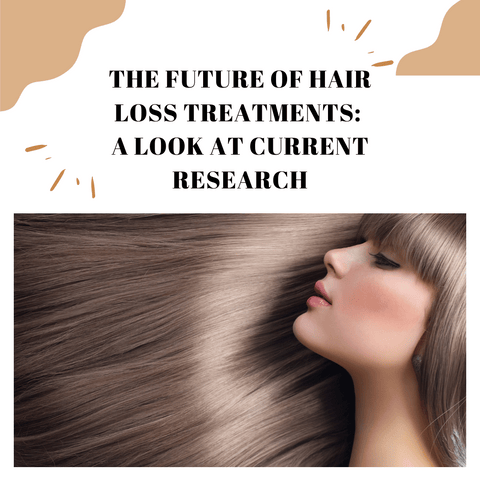
We can provide insights into some of the promising directions that researchers were investigating:
-
Stem Cell Therapy: Stem cell-based treatments have the ability to regenerate hair. Researchers were looking into using stem cells, such as mesenchymal stem cells and induced pluripotent stem cells, to increase hair follicle growth and improve hair density.
-
Gene Therapy: Gene therapies that aim to change the expression of certain genes involved in hair development could provide novel options. Researchers were looking into ways to boost the activity of hair-promoting genes while inhibiting those that cause hair loss.
-
Cytokine Modulation: Cytokines, signaling molecules involved in inflammation and immunological responses, are being investigated for their possible impact on hair follicle regeneration and growth.
-
Platelet-Rich Plasma (PRP): PRP therapy is a treatment that uses a concentrated solution of a patient's own platelets to enhance tissue healing and growth. It has been demonstrated to stimulate hair follicles and improve hair density.
-
Low-Level Laser Therapy (LLLT): Laser caps and helmets, for example, are being examined for their ability to stimulate hair follicles and increase hair growth via better blood circulation and cellular activity.
-
Drug Development: Researchers are still looking for new pharmacological molecules that target specific pathways involved in hair growth and loss. Some substances aim to boost hair regeneration by modifying the behavior of hair follicle stem cells.
-
3D Printing and Tissue Engineering: 3D printing and tissue engineering advancements have resulted in the fabrication of artificial hair follicles that can be transplanted to encourage natural hair growth.
-
Nanotechnology: Nanoparticles and nanomaterials are being investigated for their potential to deliver drugs directly to hair follicles, improving treatment effectiveness and minimising side effects.
-
MicroRNA Therapies: MicroRNAs are RNA molecules that are small in length and influence gene expression. Researchers are investigating how changing microRNA levels can affect hair follicle growth and hair cycle regulation.
-
Personalised Medicine: Personalised treatments based on an individual's genetic composition and unique hair loss reasons are becoming increasingly possible as genetic and molecular research advances.
It is crucial to note that hair loss therapy research is dynamic and ongoing, with new discoveries and developments occurring on a regular basis. The future of hair loss treatments may include more targeted, effective, and personalised approaches to dealing with diverse types of hair loss. We recommend reading reliable scientific journals, and medical news sources, and receiving information from respected hair loss research organisations. A consultation with a medical practitioner or dermatologist can provide information on the most recent treatment options for your specific case.
Emerging Treatments and Therapies
We can provide you with an overview of some of the emerging treatments and therapies that were being investigated at that time, such as JAK Inhibitors, PGD2 Inhibitors, WNT Pathway Modulators, Topical Anti-Androgens, Exosome Therapy, Hair Cloning and Multiplication, Crispr-based therapies, Peptide Therapies, Vascular Endothelial Growth Factor (VEGF) Therapies, and Microbiome-Based Approaches. These emerging treatments and therapies represent the cutting-edge of hair loss research and may offer promising solutions for individuals experiencing different types of hair loss. However, further research and clinical trials are needed to validate their safety and effectiveness.
Understanding the Effect of Stress and Nutrition on Hair Health
Stress and nutrition both play important roles in maintaining good hair. Your hair's condition is influenced by a variety of internal and environmental variables, and treating stress and ensuring sufficient nutrition is critical for fostering optimal hair health.
Effect of Stress on Hair Health: Stress can have a direct impact on hair health through multiple mechanisms:
-
Telogen Effluvium: Severe stress can cause telogen effluvium, a condition in which a significant number of hair follicles enter the resting (telogen) phase at the same time. Over time, this causes greater hair shedding and thinning.
-
Hormonal Imbalance: Stress can disturb hormonal homeostasis, resulting in cortisol and androgen imbalances. Cortisol levels that are too high can have an effect on hair follicle activity and contribute to hair loss.
-
Inflammation: Chronic stress can cause inflammation throughout the body, including the scalp. Inflammation can cause hair loss by disrupting the regular hair growth cycle.
-
Trichotillomania: Stress can also show up as hair-pulling behaviors (trichotillomania), which can result in hair loss and thinning.
Effect of Nutrition on Hair Health: Nutrition is essential for good hair development. Hair is made up of a protein called keratin, and numerous nutrients help in keratin production and general hair health:
-
Protein: Protein is the primary component of hair, so getting enough of it is critical. Include lean protein sources in your diet, such as poultry, fish, eggs, beans, and almonds.
-
Iron: A lack of iron can cause hair loss and thinning. Consume iron-rich foods such as red meat, poultry, fish, leafy greens, and legumes.
-
Vitamins and minerals: Vitamins A, C, and E, as well as minerals zinc and selenium, are essential for healthy hair follicles and sebum production, which keeps the scalp and hair hydrated.
-
B vitamins: B vitamins, such as biotin (vitamin B7), are known to promote healthy hair growth. A biotin deficiency can lead to hair thinning.
-
Omega-3 Fatty Acids: Omega-3s promote healthy scalp tissue, lower inflammatory levels, and increase hair density. Sources include fatty fish, flaxseeds, and walnuts.
-
Antioxidants: Antioxidant-rich foods like berries, nuts, and vegetables protect hair follicles from free radical damage.
Tips for Maintaining Hair Health:
-
Reduce the impact of stress on hair health by using stress management techniques such as meditation, yoga, deep breathing, and exercise.
-
To support overall health and hair growth, prioritise a balanced diet that includes a variety of nutrient-rich foods.
-
Stay hydrated because water is essential for scalp health and hair growth.
-
Avoid crash diets and extreme restrictions, which can lead to nutrient deficiencies and hair loss.
-
If you are concerned about hair loss or hair health, seek personalised advice and recommendations from a healthcare provider or dermatologist.
Keep in mind that hair development is a gradual process, and changes in hair health may take some time to become apparent. You can establish a supportive atmosphere for good hair development and overall well-being by reducing stress and ensuring sufficient nutrition.
Important Considerations and Final Thoughts on Hormonal Hair Loss
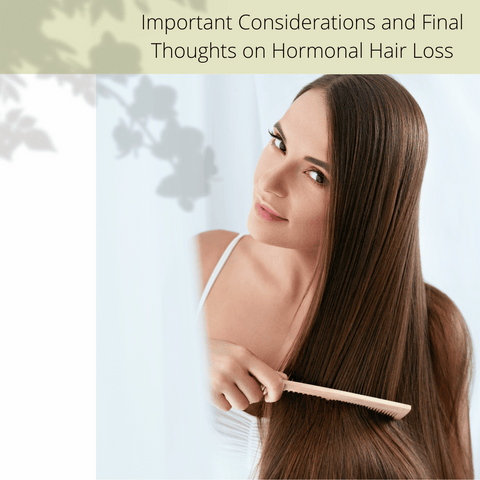
Hormonal hair loss is a complicated problem that is influenced by genetics, hormones, lifestyle, and underlying health issues. Here are some important considerations and final thoughts to keep in mind as you navigate the challenges of hormonal hair loss: Consult a professional; patience is key; a holistic approach; genetic predisposition; a combination of treatments; manage expectations; embrace your appearance; stay informed; develop confidence and self-care; and seek professional guidance. Many people suffer from hair loss, and there are services and assistance available to assist you in navigating this journey. The ultimate goal is to discover a way to feel confident and happy in your own skin, regardless of the state of your hair.
















